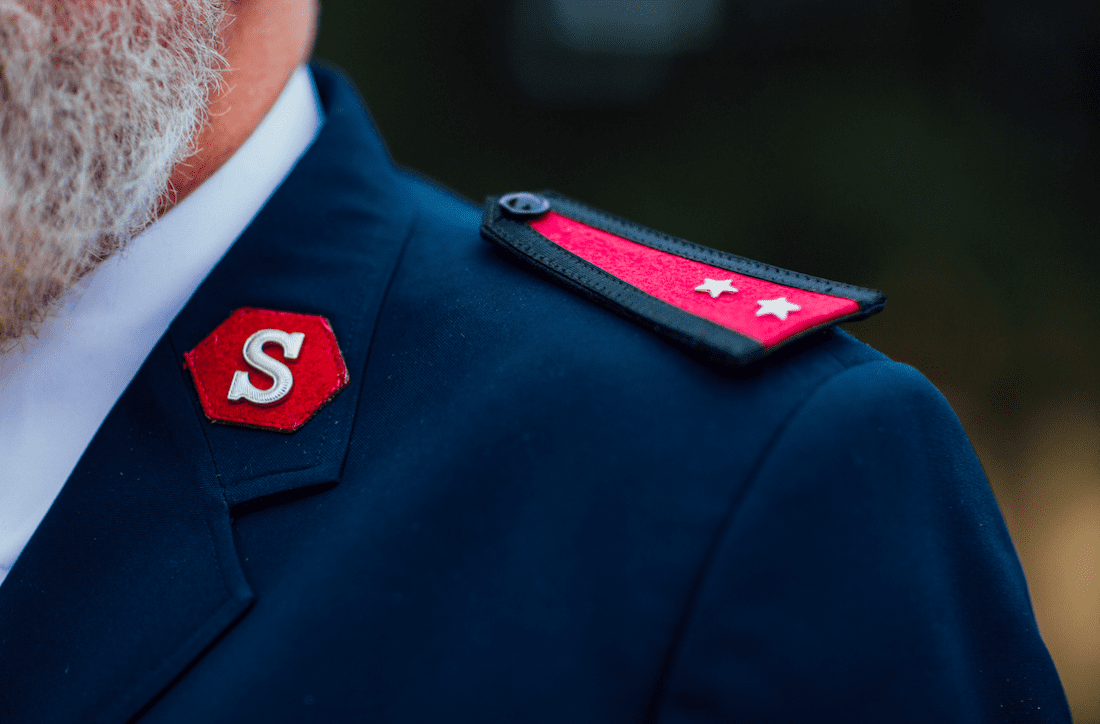For those called to officership in The Salvation Army Western Territory, the journey begins with a calling and continues at the College for Officer Training at Crestmont (CFOT). Cadets come to CFOT for the singular purpose of being trained and prepared for full-time ministry as officers. Enrollment at CFOT occurs once a year, with cadets moving through the two-year training program as a cohort, or session. All cadets who successfully complete the officer training program receive a Certificate of Salvation Army Officer Training and are commissioned and ordained as Salvation Army officers. In addition, most cadets also receive an Associate of Arts in Ministry.
Here’s what it takes to earn the rank of lieutenant in The Salvation Army:
Recruitment
The primary responsibility for the recruitment of prospective candidates rests with Corps Officers, with support from the Divisional Candidates and Recruitment Secretary. Prospective candidates attend Future Officers’ Fellowship (FOF) retreat, during which delegates seek to understand God’s call on their life and are introduced to CFOT through a sample class rotation. After an application process that includes a psychological evaluation, the Territorial Candidates and Recruitment Secretary and Territorial Candidates Council decide if an applicant is a candidate for training.
Pre-training
Before entering CFOT, all candidates are enrolled in Salvationism 101, a 10-week online course that provides instruction on topics such as the role of the Salvation Army officer, women in ministry and the organizational structure of The Salvation Army.
Welcome of Cadets
A Welcome of Cadets ceremony is held for first-year cadets at the start of the academic year as they begin training at CFOT. The event is attended by Salvationists and friends.
Education for first-year cadets
In addition to general education requirements, like English and music in The Salvation Army, first-year cadets take four biblical studies classes, focusing on Old Testament surveys, and four theological studies courses. Other coursework includes business management, corps administration, spiritual formation and evangelism and discipleship. Cadets must also take a worship arts elective, as well as a pair of spring elective courses, like biblical equality and world missions, throughout training.
Fall Blitz Evangelistic Campaign
In the fall, mixed brigades of first and second-year cadets engage in weekend evangelistic campaigns at various corps and units across the California South Division. In 2019, cadets participated in a Homeless Justice Immersion in Orange County, California, as part of their annual Fall Blitz weekend. The Western Territory’s Social Justice Department facilitated the event—the first of its kind.
Christmas Assignment
During November and December, cadets are assigned to corps in the West for practical training on the spiritual and administrative sides of kettles and the wider Christmas effort.
Spring Campaigns
In the spring, mixed brigades of first and second-year cadets travel throughout the Western Territory for week-long evangelistic campaigns at various corps and units. Due to the COVID-19 pandemic, cadets did not participate in traditional spring campaigns in 2020. Instead, they served in Emergency/Disaster Services roles in the California South Division.
The Mantle Service
The Mantle Service, a private ceremony, occurs the day after both sessions of cadets complete their studies. The ceremony allows second-year cadets to symbolically pass from the studying stage into their future lives as servants of God. As the cadets’ names are called, CFOT officers line up in front of the cadets according to the year of their commissioning as a reminder of their commitment to officership.
The names of each second-year cadet are then announced. Individually, they step forward and receive a new tunic with lieutenant’s trim. Training leaders place a long red ribbon with a lieutenant’s star—the mantle—around their necks and help them into their new jacket. The mantle drapes across the new tunic. After the second-year cadets are mantled, it’s their turn to pass the mantle to the first-year cadets. They place a long blue ribbon with second-year cadet bars around the neck of their “buddies,” those students assigned to them for help during the first days of orientation.
Summer Assignment
Second-year cadets are assigned to various corps to receive onsite training as a summer internship. During the assignment, cadets focus on business administration, homiletics and evangelism. Summer assignments for 2020 were scaled back due to the coronavirus, but cadets from the Messengers of Grace session will be sent out to every division in the West except the Alaska and the Hawaiian and Pacific Islands divisions.
Education for second-year cadets
In addition to general education requirements, like history, sociology and health and wellness, second-year cadets take three New Testament survey courses, three homiletics courses, as well as comparative beliefs and ethics courses. As they prepare to be commissioned to the field, they take seven ministry and mission courses, including Mission and Culture and Intro to Addiction and Recovery, as well as three business management courses.
Spiritual Formation Activities
Cadets attend biweekly chapel services and participate in prayer and discipleship groups.
Crestmont Activities
Cadets participate in various activities at Crestmont, including a 5K and Valentine’s Day fundraisers for World Services and an on-campus health fair.
Required seminars and lectures
In addition to their academic coursework, cadets are required to attend a series of seminars and lectures, including Emergency/Disaster Services (EDS), Adult Rehabilitation Center (ARC), Advisory Board, Multicultural Perspectives for Ministry, Sexual Harassment Prevention and Protecting the Mission.
Commissioned and Appointed
Upon successful completion of the Officer Training program at CFOT, graduating cadets are commissioned and ordained as Salvation Army officers and provided with an appointment in full-time ministry at a Salvation Army corps or other facility.
Continuing Education
The Salvation supports and trains officers throughout their careers, including through Territorial Officers’ Institute (TOI). In January 2020, fifth-year lieutenants from the Heralds of Grace Session participated in a town hall meeting with territorial leaders Commissioners Kenneth G. and Jolene K. Hodder to prepare for their transition to captains, which comes after five years of service as lieutenants.











